
Hieronymus Bosch was a Dutch/Netherlandish painter from Brabant. He is one of the most notable representatives of the Early Netherlandish painting school. His work, generally oil on oak wood, mainly contains fantastic illustrations of religious concepts and narratives. Within his lifetime his work was collected in the Netherlands, Austria, and Spain, and widely copied, especially his macabre and nightmarish depictions of hell.

The Gallerie dell'Accademia is a museum gallery of pre-19th-century art in Venice, northern Italy. It is housed in the Scuola della Carità on the south bank of the Grand Canal, within the sestiere of Dorsoduro. It was originally the gallery of the Accademia di Belle Arti di Venezia, the art academy of Venice, from which it became independent in 1879, and for which the Ponte dell'Accademia and the Accademia boat landing station for the vaporetto water bus are named. The two institutions remained in the same building until 2004, when the art school moved to the Ospedale degli Incurabili.

The Ponte dell'Accademia is one of only four bridges to span the Grand Canal in Venice, Italy. It crosses near the southern end of the canal, and is named for the Accademia di Belle Arti di Venezia, which from 1807 to 2004 was housed in the Scuola della Carità together with the Gallerie dell'Accademia, which is still there. The bridge links the sestieri of Dorsoduro and San Marco.
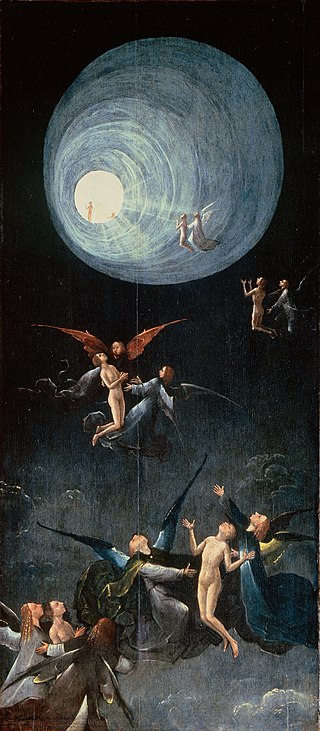
Ascent of the Blessed is a Hieronymus Bosch painting made between 1505 and 1515.

Terrestrial Paradise is a painting by Netherlandish artist Hieronymus Bosch, dating from around 1490. It is now in the Gallerie dell'Accademia in Venice, Italy. The painting depicts Terrestrial Paradise, where the remaining sins of the saved were washed away. The Fountain of Life stands on top of the hill.

Hell is a Hieronymus Bosch painting made after 1490. It is currently in the Gallerie dell'Accademia in Venice, Italy.

The Crucifixion of Saint Wilgefortis is a c. 1497 triptych by the Early Netherlandish painter Hieronymus Bosch. The subject of the painting has been uncertain, and it has also been known as the Triptych of the Crucified Martyr, or The Crucifixion of Saint Julia, but is now believed to depict Saint Wilgefortis.

The Hermit Saints is a religious oil on panel painting displayed as a triptych, meaning it is one whole painting composed of three separate scenes. This artwork was made by the Renaissance artist Hieronymus Bosch, dating from 1493. The entirety of the triptych painting measures 86 by 60 centimetres. This artwork is currently being housed at the Gallerie dell'Accademia, Venice.

The Accademia di Belle Arti di Venezia is a public tertiary academy of art in Venice, Italy.
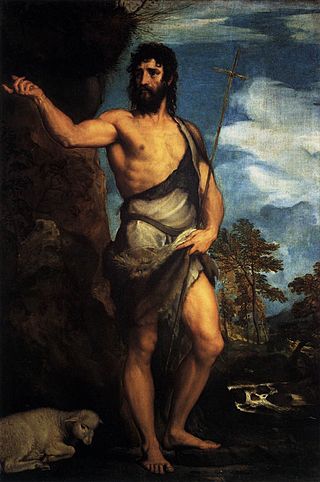
Saint John the Baptist is a c. 1540 painting of John the Baptist by Titian, with his traditional attributes of the Lamb of God and a staff. It is part of the collection of the Gallerie dell'Accademia of Venice, Italy.

Hieronymus Bosch, Touched by the Devil is a 2015 Dutch documentary film directed by Pieter van Huystee about the Dutch artist Hieronymus Bosch. It documents how The Haywain Triptych is exhibited in Bosch's hometown of 's-Hertogenbosch for the first time in almost 500 years.
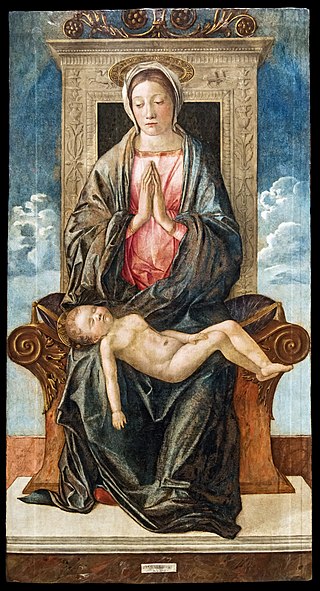
Enthroned Madonna Adoring the Sleeping Christ Child is a 1475 tempera on panel painting by Giovanni Bellini, now in the Gallerie dell'Accademia in Venice, which acquired it in 1812.

Supper in the House of Simon the Pharisee is a 1544 oil on canvas painting by Moretto da Brescia, now in the Chiesa della Pietà in Venice, Italy.
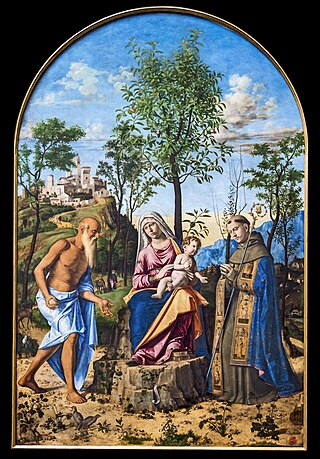
Madonna of the Orange Tree is a 1496-1498 oil on panel painting by Cima da Conegliano. It was originally produced for the church of Santa Chiara in Murano, from which it was confiscated for the Gallerie dell'Accademia in Venice, where it now hangs.

Adam and Eve, also known as The Temptation of Adam, Original Sin, and The Fall of Man, may refer to either of two similar works by the Venetian painter Tintoretto: an oil painting in the collection of the Gallerie dell'Accademia in Venice, made around 1550–1553; and a panel in the ceiling of the Upper Hall of the Scuola Grande di San Rocco, made around 1577–1578.
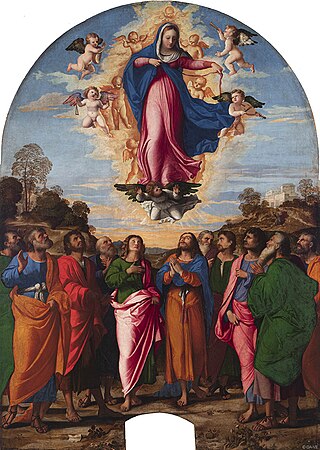
The Assumption of the Virgin is an oil on panel painting by Palma Vecchio, created c. 1513, now in the Gallerie dell'Accademia in Venice.

Storm at Sea or Saints Mark, George and Nicholas Freeing Venice from Demons is a c. 1528 oil on canvas painting by Palma Vecchio, now in the Gallerie dell'Accademia in Venice. It was partly completed in 1535 by Paris Bordon after Palma's death.
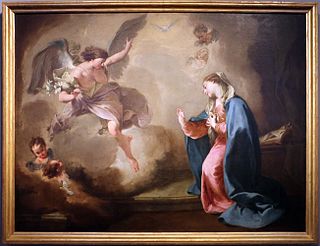
Annunciation is a c. 1757 oil on canvas painting by Giovanni Battista Pittoni, now in the Gallerie dell'Accademia in Venice.
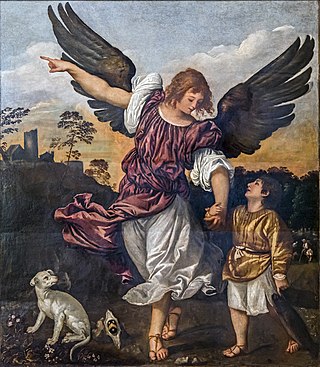
The Archangel Raphael and Tobias is an oil painting by Titian, dated to about 1512 to 1514, which is currently housed in the Gallerie dell'Accademia in Venice. Another painting by Titian on the same theme, entitled Tobias and the Angel, and dated to about 1540 to 1545, is preserved in the church of the Madonna dell'Orto in Venice.



















